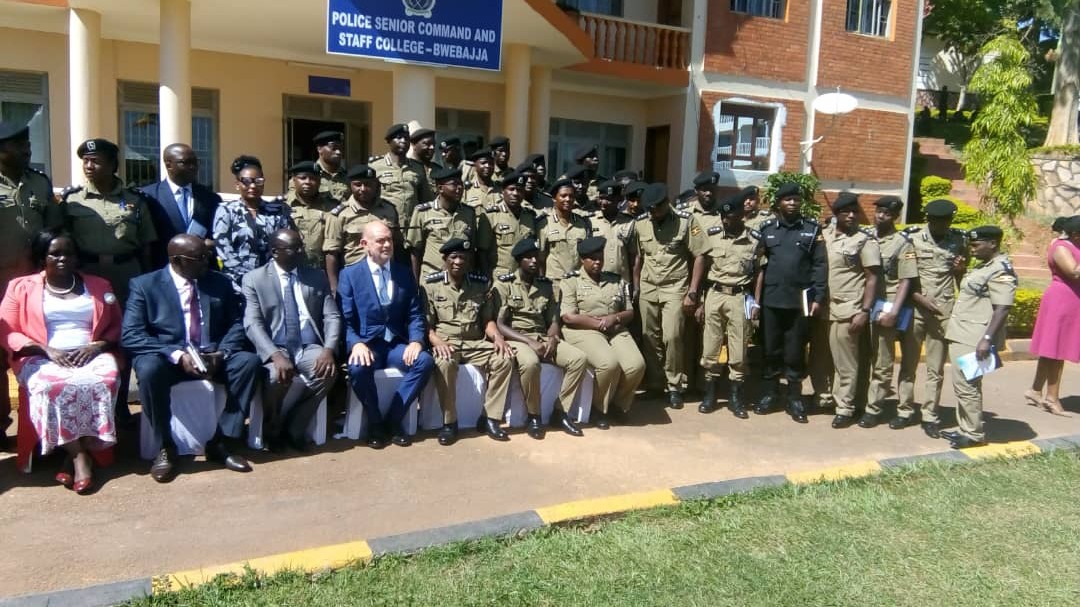The Inspector General of Police (IGP), Okoth Ochola has appealed to officers of the Uganda Police Force to uphold human rights during the course of their operations.
He was speaking during the launch of the Human Rights Policy prepared by the Uganda Police in collaboration with Human Rights Network (HURINET) at the Police Senior Commanders and Staff College, Bwebajja on Wednesday.
Ochola said that even when Police officers are mandated to protect life and property, prevent and detect of crimes, keep law and order as well as maintain the overall safety of Ugandans, they must do so in a manner that complies with human rights.
‘’In the execution of our mandate as police officers, the law has specific powers such as the use of force and firearms and the power to arrest and detain. While exercising these powers, we must comply with the duty and obligation to observe the human rights of the people being policed,’’ Ochola said.
‘’Whatever the security situation may look like, it is our conviction that only human rights compliant policing is good policing. It is our resolve therefore to endeavour to continuously strengthen and promote respect for human rights in the Uganda Police Force,’’ he added.
He said that the policy confirms commitment on the part of the Police management, to observe and ensure human rights in police operations, before adding that, it provides an apparatus to measure compliance and ensure human rights observance.
The launched policy breaks down complicated human rights laws and instruments to implementable levels and is premised on officers respecting and promoting human rights, acting with fairness, self-control, tolerance and impartiality as well as upholding integrity towards members of the public while performing their duties.
On her part, the Chairperson HURINET Board of Directors, John Mary Odoy commended Police for the policy which she said has come at an opportune time when the country is yearning for change of policing culture.
‘’It is a key milestone in the move towards building a formidable, democratic and accountable and human rights sensitive institution,’’ she said.
When contacted for a comment about the matter, human rights lawyer and CEO Legal aid, Isaac Ssemakadde said the idea is good but lacks a public touch since Ugandans were not involved in the making process.
‘’The formulation of the policy should have been characterislzed by massive public sensitization and participation. What we have seen today are views and a product of a few elite minds, who assume that they represent the ideas of all Ugandans,’’ he said.
The event themed ‘’Towards a democratic, accountable and human rights sensitive policing in Uganda’’, was also attended by the British High Commissioner, Peter West, Deputy IGP, Maj Gen Sabiti Muzeyi and Directors in the Police Force.
Police has perennially been named by local and international rights reports as being the government institution that violates human rights the most. The Force has previously been accused of torture, arbitrary arrests and unlawful detention of suspects (beyond the 48hour Constitutional cap). In the 2018 Human Rights Watch (HRW) report released last month, security agencies (Police and the military) were cited for perpetrating rights violations against civilians.
The report summarized key human rights issues in more than 100 countries and territories worldwide, drawing on events from late 2017 through November 2018.
In the case of Uganda, the report captures the allegations of widespread repression and intimidation of parliamentarians that characterized the process of passing the controversial constitutional amendments in 2017.
The report also cites “violations of rights to freedoms of association, expression, and assembly persisted, as security forces beat and at times, tortured and arbitrarily detained protesters, journalists and opposition members” in Uganda.
Human Rights Watch cited the incident that occurred in Arua district in August of last year where 33 people, including MPs Robert Kyagulanyi (Bobi Wine), Paul Mwiru, Francis Zaake, Gerald Karuhanga were arrested.
“Despite various government commitments to hold security forces accountable for their conduct, many investigations into military and police abuses of civilians failed to progress, including into the November 2016 killing of more than 100 civilians in Kasese, western Uganda, and the killings of protestors in September 2009 and April 2011,” the report read in part.








